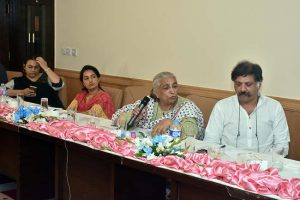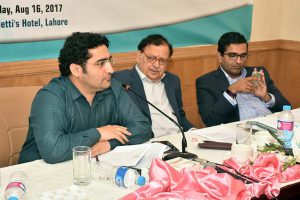Provincial Dialogue Forum – 5
Scholars and intellectuals shall be provided prominence in the society to counter extremist sympathies in Punjab. In universities and colleges, intellectual debates shall be encouraged. Only then can they break the mould of extremism.
These thoughts came in the fifth provincial dialogue forum on Punjab, held in Lahore, on 16 August 2017. Noted scholars, academics, policy makers, civil society members attended the forum, deliberating on safe charity in Punjab.
This dialogue discussed the intellectual and scholarly trends that have challenged or have the potential to counter violent extremism in Punjab. It was the fifth such discussion, all aimed at exploring areas to counter extremism in Punjab.
The group members agreed that assessment of dominant intellectual trends in Punjab had been a neglected area. The tradition, expertise and resources needed for such an endeavor in an organized manner appeared to be lacking. Dr. Muhammad Waseem, who moderated the first sessions, agreed that universities largely lack spaces to hold debates, and at times, look towards the state to support them.

Members, especially from civil society, agreed that the space for scholarly responses to counter violent extremism seemed to have shrunk in recent decades. One member even suggested that academics and intellectuals of today no longer sensitize the society on its pressing issues, extremism being the top one.
Taking part in the discussion, Dr. Rasul Baksh Raees, academic, called for avoiding generalization and relying on pure empirics. With sound facts and evidences, proper policies could be shaped, he said.

Meanwhile, Dr. Tahir Kamran, chair of history department at the Government College University (GCU) Lahore, laid out the history of scholarly trends in and around extremism in Punjab. Member of the group noted how extremism in the province has a clear-cut sectarian dimension, which is worrisome.
The group agreed that those speaking out against extremism had been demonized and some forced to leave Pakistan for speaking their mind. Besides, not only in the context of countering extremism, but when it comes to intellectual pursuits in general, the trend has been one of complete neglect.
It was also noted public institutions of higher learning in Punjab today were controlled by student wings affiliated with religious political parties. The administration was blamed to this end. But one member reminded that many public universities in Punjab have no vice chancellors; this administrative vacuum is then filled by parties strong on the ground.

Prominent members who attended the discussion included Salman Abid, senior journalist; Sajjid Mehmood Awan, National Institute of History, Quaid-e-Azam University, Islamabad; Yaqoob Bangash Professor of History, Information Technology University, Lahore; Iqbal Chawala Dean, Faculty of Arts & Humanities & Chairman, Department of History, University of the Punjab, Lahore; Saeeda Deep Executive Director, Peace and Secular Studies, Lahore; Najam u Din Director, Human Rights Commission of Pakistan, Lahore; Dr Nousheen Hamid MPA PTI; Shahzada Irfan, journalist; among other.

